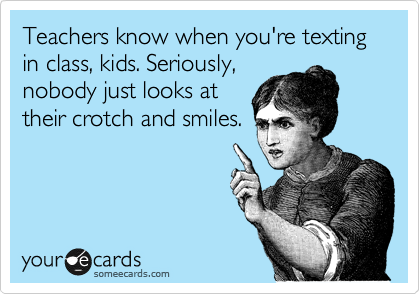The three biggest challenges facing us related to English Composition are:

- Privacy/ ownership: this includes shared creation of information on plagiarism and copyright (eg look at the caption on the meme I grabbed. Shouldn’t it read http://cdn.someecards.com/someecards/usercards/1333238359437_4954126.png?)
- Resource management: that includes literacy in economics and natural sciences and how to access and process informational resources (eg climate change data and it’s interpretation (this vs that), bias, etc).
- Effective digital profiles: includes communicating effectively via social media, using multi-modal communication taking advantages of current technology, and while doing so demonstrating command of tone and understanding of audience (eg trigger warnings, troll-like behavior, formal and professional expectations of language use).
Shit. They kinda read like Strategic Learning Objectives (SLO).
Musing this morning about how connect what’s in my syllabus with early writing prompts and topical readings. Note in my syllabus where it asks students not to text in class without the expressed consent of everyone in the room, which means asking and recieving a clear binary response. This could be linked to campus “Yes means yes and everything else is no” (is it?), and number one above. Everyone should read how it’s legal to shoot upskirt photos without consent in 45 states, and ask if its legal, should it be allowed in my class. Personally I’m against it. How do we govern behavior? The article posits the argument that if no one is aware their own underwear photos exist and are being viewed, what is the harm? How does this relate to what Snowden revealed?
http://www.uschronicle.com/meme-shows-wrong-climate-prophet-al-gore/
or consider: